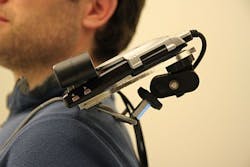Wearable camera-projector combination creates interactive surfaces
A wearable projection system developed by researchers at Microsoft Research (Redmond, WA) and Carnegie Mellon University (Pittsburgh, PA) turns pads of paper, walls or even hands, arms, and legs into graphical, interactive surfaces.
The so-called OmniTouch system employs a depth-sensing camera -- similar to the Microsoft Kinect -- to track the user's fingers on surfaces, and a laser pico-projector mounted on the user's shoulder. The projector superimposes keyboards and keypads onto any surface, automatically adjusting for the surface's shape and orientation to minimize distortion of the projected images.
With the system, users can control applications through their fingers, much as they can with touch screens found on smart phones or tablet computers.
Chris Harrison, a PhD student in Carnegie Mellon's Human-Computer Interaction Institute, developed the system with Microsoft Research’s Hrvoje Benko and Andrew Wilson while working there as an intern.
More information on the OmniTouch system can be found at http://www.chrisharrison.net/index.php/Research/OmniTouch.
-- By Dave Wilson, Senior Editor, Vision Systems Design
